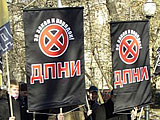Russia: Xenophobia on the rise
2009
By Diyar Autal for ISN
The murders of prominent Russian human rights lawyer Stanislav Markelov and Novaya Gazeta journalist Anastasia Baburova on 20 January in Moscow are almost certainly linked to their anti-extremist persuasions and activities, drawing attention to growing xenophobic violence in the country.
Markelov had worked on numerous high-profile human rights cases. Most famously, he represented the family of Elza Kungayeva, a Chechen woman killed by a Russian army Colonel Yuri Budanov. The case was controversial with Russian nationalists supporting Budanov and his early release. Markelov had campaigned against Yuri Budanov's early release, but last week, a court ruled that he could go free.
There has been a steady escalation of violent xenophobia in Russia during the last decade - an escalation that can be measured against an already high level of xenophobic sentiments. When asked in 1995, 38 percent of Russians said they supported the concept of "Russia for [ethnic] Russians." In 2007, 55 percent of respondents expressed full or partial support for the concept, according to the external page Levada Center, an independent public opinion institute.
In a country as diverse as the Russian Federation - where non-Slavic peoples comprise some 20 percent of the population - the notion of a "Russia for Russians" has explosive potential, and in the long term, poses an existential threat to the country and its territorial integrity.
The external page SOVA Center, an independent Moscow-based research institution, estimates that 87 people were killed and 378 injured in racist attacks in 2008. Aside from Moscow (51 killed, 175 injured) and St Petersburg (15 killed, 37 injured), racist incidents were recorded in 39 regions of the country. In comparison, during 2004 there were 46 recorded lethal cases as a result of racist attacks and 208 people were injured.
Immigrants are the main targets of xenophobia and racist attacks in Russia. Natives of the Caucasus, most of them internal migrants and guest workers from Central Asia and China, are often looked upon with resentment and hostility.
There has been a rise in the number of informal radical nationalist groups, or skinheads, as well as organized nationalist movements. According to the SOVA Center, the informal neo-Nazi skinhead movement is one of the largest in the country, with 50,000 followers and around 10,000-20,000 active members. For the most part, the movement is made up of youth who paint racist graffiti in Russian cities and organize group attacks against people who appear to be non-Slavic.
Organized nationalist groups, such the Movement Against Illegal Immigration (DPNI), have also been active in recent years, organizing angry rallies across Russia, demanding that the government "cleanse" cities of migrant workers. Hundreds of protesters were detained in Moscow during the last "Russian March," held annually on 4 November, National Unity Day.
The Russian authorities' management of the rise of xenophobia has not been unequivocal. During the initial escalation of racist violence, police treated racially motivated attacks (even those with fatal outcomes) as mere "hooliganism," and skinheads acted with a sense of impunity. Recently, however, the number of prosecutions for racially motivated violence has increased.
The last two governments came to power on a wave of xenophobic sentiments in the wake of the Second Chechen War. Indeed, the war in Chechnya in effect brought Vladimir Putin to power, and his regime used xenophobia to unify Russian society.
On the other hand, both Prime Minister Putin and President Dmitry Medvedev have publicly spoken of the dangers of extreme nationalism. The regime does have concerns that xenophobic sentiments in Russia might be politically exploited by extreme nationalist groups and as such could represent a major threat to national security.
The causes of the growing xenophobic sentiments in Russia are complex. The Soviet Union, with its harsh suppression of any open manifestations of nationalism, kept xenophobic sentiments at bay. However, nationalism became increasingly pronounced in the glasnost years, with conflicts with nationalist overtones in all parts of the Soviet Union in the second half of the 1980s. In this regard, nationalist tensions and sentiments, which had a long history in Russia, were unleashed by the demise of the communist state.
The collapse of the USSR and its ensuing ideological vacuum necessitated a reformulation of Russian national identity. In the absence of any coherent new Russian national civic ideology, an identity based on ethnic affiliation - which can only develop in relation to and at the expense of the "other" - became appealing to many Russians.
On the other hand, the objective circumstances of modern Russia and its recent history have also played a major role. The two wars in Chechnya and terrorist hostage-takings in the Dubrovka theater in 2002 and Beslan in 2004, greatly contributed to the development of aversion toward people from the Caucasus and other foreigners.
With the waiver of Soviet restrictions on internal and external migration, Russian cities have received an unprecedented number of guest workers and refugees from the Caucasus. The cultural differences between them and Russians are often vast and engender resentment and fear.
The raging financial crisis and increasing unemployment levels in Russia will almost certainly cause a further escalation of xenophobic violence with an economic dimension.
Russia is a country lacking ideas and ideals that can bring its people together. Unlike in the West, where belief in democracy, freedom of speech and human rights unite people across the political spectrum, the majority of Russians do no share these values. The only thing that can bring Russians together is a common threat, be it real or perceived, external or internal. With xenophobic sentiments at their height in a country that defeated Nazism in WWII, they will remain an easy target for political opportunists to exploit.
